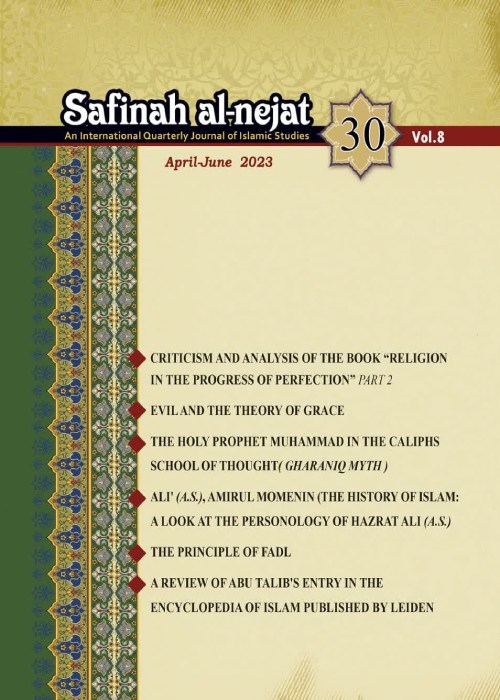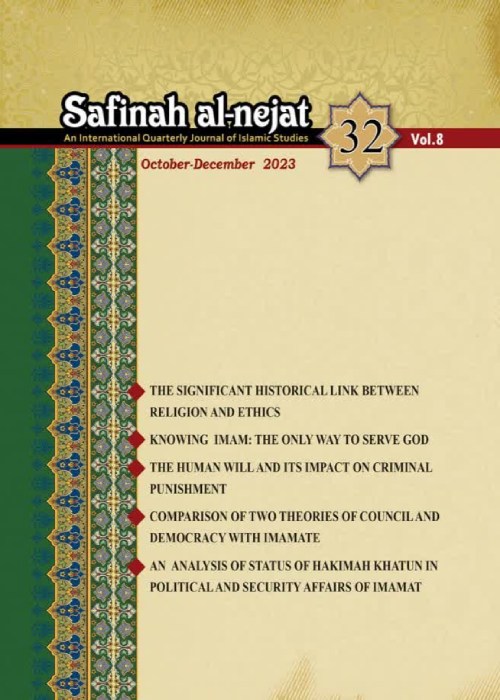فهرست مطالب

Safinah al-nejat
Volume:8 Issue: 30, Spring 2023
- تاریخ انتشار: 1402/02/11
- تعداد عناوین: 6
-
Pages 10-42
The book “Crisis and Consolidation in the Formative Period of Shiite Islam” has been written by Dr. Hossein Modaressi Tabatabaei based on two aims 1. Introduction of Shiite Islam as belief trend in Islam for Western and non-Muslim readers. 2. Recognizing the progress and consolidation of Shi’ismin the first three Islamic centuries.The first section of the book “Rights and Responsibilities” includes a brief glance at the Shiite history from the beginning of the minor occultation of which a major portion has been analysed in this criticism.
Keywords: Book “Crisis, Consolidation in the Formative Period of Shiite Islam”, Criticism, Analysis, Shiism, Shiite history, Imamate, Caliphate, Occultation of Imam-e-Asr (a.s.) -
Pages 43-60
What has been discussed so far are the questions that Corona and evil pose to religious teachings. But some of the problems that Corona creates for religious beliefs go back to some philosophical foundations. In the present article theory of Grace and evils are dealt with.
Keywords: Grace, Qadar, natural causation -
Pages 61-75
In order to remove the dust of slander from the sacred and luminous face of the beloved Messenger of God, we will study a part of the view of the school of caliphs towards Prophet (p.b.u.h.). We apologize the divine Prophet of God Almighty for telling such inappropriate reports and emphasize that our goal is to familiarize the minds with a part of cultural crimes. In this way, some stories must be told; Although the pen is ashamed of quoting many of these stories.
Keywords: slander, Gharaniq, prophet Muhammad, caliphs school of thought -
Pages 76-88
Islam is the last religions and the Messenger of God, may God bless him and grant him peace, is the last prophet and the Qur'an is the last divine books. In this way, Islam is not bound to any time and is universal, and the Prophet is the communicator of a religion that has the color of eternity and time does not expire it. On the other hand, the way of creation is such that the Messenger of God, like other human beings, has a limited outward life, and according to the clear word of the Qur'an, he will also taste death, as others: ک هن إ تو ن هنه م م ی ت وإ ی م ; You are mortal, and they are mortal."(Zumar: 30).
Keywords: ‘Ali, vilayat -
Pages 89-98
In this principle, the attraction of benevolence in humans is considered as a basic characteristic. This feature shows that goodness and beneficence are effective on a person and even have the power to curb his bad behavior. With regard to this characteristic of man, we speak of the principle of Fadl "bounty".
Keywords: educational goals, the essence of truth, Fadl (bounty) -
Pages 99-125
Abu Talib is one of the most pivotal figures in the history of Islam, who was influential in many events of the Prophet's (PBUH) era, especially during the period of the Prophet's mission. It seems that knowing his role in the developments of the time of Bi’that is a measure to know the position of the family of the Prophet (PBUH) in the fruition of the mission. The main focus of the research is that what image do the authors of the Leiden edition of the Encyclopaedia of Islam, which is the most famous and complete encyclopedia about Islam depict about Abu Talib? In this article, by examining the contents of the three articles of Abu Talib written by Buhl, Watt and Rubin, it was shown that none of these three articles are encyclopedic type as they should be. These articles not only did not use the proper sources and researches of Muslims, especially Shiites, but they do not even reflect the works and researches of Westerners about Abu Talib. These articles are clearly inclined to the thoughts and opinions of Sunnis; While the main purpose of encyclopedia articles is to avoid sectarian biases and organize and reflect the latest and most important information available from that entry in the researches.
Keywords: Abu Talib, Uri Rubin, Encyclopaedia of Islam, Frants Buhl, Montgomery Watt


